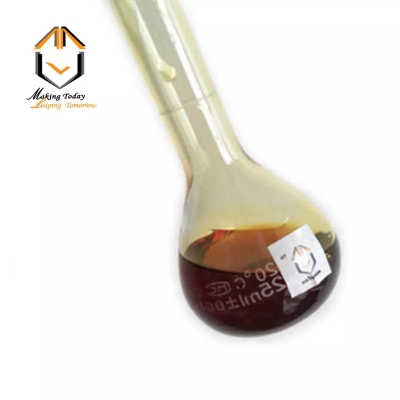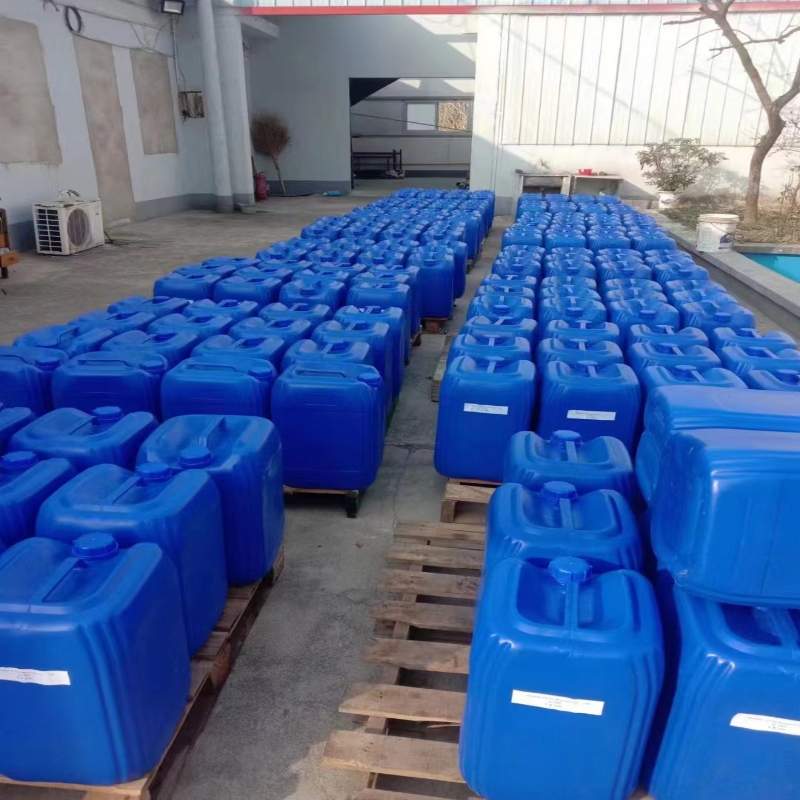-
Categories
-
Pharmaceutical Intermediates
-
Active Pharmaceutical Ingredients
-
Food Additives
- Industrial Coatings
- Agrochemicals
- Dyes and Pigments
- Surfactant
- Flavors and Fragrances
- Chemical Reagents
- Catalyst and Auxiliary
- Natural Products
- Inorganic Chemistry
-
Organic Chemistry
-
Biochemical Engineering
- Analytical Chemistry
-
Cosmetic Ingredient
- Water Treatment Chemical
-
Pharmaceutical Intermediates
Promotion
ECHEMI Mall
Wholesale
Weekly Price
Exhibition
News
-
Trade Service
Recently, the price cap plan implemented by the G7 for Russian crude oil has attracted a lot of attention, but various factors indicate that the oil price ceiling will not work
.
First, the price limit plan is the product of geopolitical struggles and has few
followers.
Second, limiting oil prices is a dilemma, and the price restriction measures in the United States and Europe cannot achieve the expected results
.
Third, the US and Europe's intervention in markets for political purposes has been resisted by OPEC
.
In addition, the marine insurance market is not completely monopolized by Britain and the United States, and Russia will largely avoid sanctions
.
In short, the United States and the West insist on going their own way, and the price limit plan for Russian crude oil may become another "gray rhinoceros", disrupting the oil market and dragging down the world economic recovery
.
The U.
S.
-led Group of Seven (G7) decided to implement a price cap program for Russian crude exports from December 5
.
The proposal has been brewing for more than half a year and is quite controversial
.
The EU has been unresolved for a long time, and now it is time for "ugly women to see their in-laws
".
The outside world generally disagrees with the G7 price limit measures, believing that this move is both harmful to others and not to itself, not to mention that it may not work in actual operation, and in the end it will only be "lifting a stone and shooting yourself in the foot"
.
Daniel, a former chief economist at the U.
S.
State Department, noted that the G7 overestimated their influence on global crude oil trade and that the sanctions were largely self-inflicted
.
Industry insiders believe that the price limit on Russian crude oil will fundamentally change the crude oil transportation route, and many unrelated countries in the world will suffer from it, and will fall into poverty
due to energy shortages and rising prices.
Even in Washington, controversy continues, and even in the Biden administration there are fears that such a move could backfire and lead to a sharp shock in oil prices
.
UBS estimates that once the limit is officially implemented, the price of Brent crude futures will reach $125 per barrel
.
Why doesn't an oil price cap work?
First, it is the product of geopolitical struggles with few followers
.
So far, only Australia has publicly expressed its support for the G7 plan, and the EU is making a fuss because of the price issue
.
U.
S.
Treasury Secretary Janet Yellen proposed a price cap in May this year, aiming to minimize Russia's crude oil export earnings
without affecting global crude oil supplies.
The idea is beautiful, but the reality is skinny
.
China has long indicated that it is not interested in such a move, and India has remained neutral
despite repeated persuasion by the United States.
Not long ago, Yellen returned from another visit to India, leaving only one sentence, the price limit is beneficial
to China and India and other oil-consuming countries.
However, countries are well aware of America's geopolitical manipulation
.
According to a poll released by the India Observer Research Foundation, 43% of Indians believe that Russia is their most reliable partner, much higher than the 27%
of the United States.
Second, it is difficult
to limit oil prices.
Earlier, foreign media reported that Yellen wants to cap the price of Russian crude oil at $60 per barrel, which is about 20% lower than the price price of Russian exports in August, but still close to the upper limit
of the price range in recent years.
Prices were between $65 and $70 per barrel when they were later presented to EU countries for negotiations, and in early November, Russian Urals crude was priced at just over $70 per barrel
.
The price is so close, which means that the US and European price limit measures will not have the desired effect
.
Even then, there was disagreement within the EU, and the negotiations were bogged down
.
According to Rystad Energy, the cost of Russian crude oil production is between $20 a barrel and $50 a barrel, depending on how
the data is calculated.
In addition, the Russian government budget includes forecasts that the average price of crude oil exports in 2023 will be about $70 per barrel
.
Therefore, the price limit is too high and has no effect, if the limit price is too low, Russia is likely to retaliate by stopping some crude oil exports, which will inevitably impact the global oil market
.
Third, US and European market intervention for political purposes has been resisted
by the Organization of the Petroleum Exporting Countries (OPEC).
At the OPEC+ ministerial meeting in Vienna in October, member states agreed to cut production quotas by 2 million barrels per day, an unusual move that deviated from the United States
, which immediately sent shock.
In fact, the more worrying within OPEC+ is that if the price cap mechanism succeeds, OPEC may become the next target
.
The White House threatened to respond
to OPEC+'s "short-sighted" and "misguided" decision.
Relations between OPEC and the United States appear to be at a turning point
.
Biden's repeated requests and threats have failed to influence OPEC's decision, suggesting that OPEC members are increasingly less interested in
U.
S.
concerns.
Obviously, OPEC has its own judgment and position
on the oil market.
And OPEC+ has a clear attitude, when the price limit on Russian oil takes effect on December 5, other OPEC+ members will allow market prices to fluctuate sharply, and will not intervene and fill the supply gap
.
In addition, the key point of sanctions is marine insurance services
.
Price caps backed by the U.
S.
, JAPAN, U.
K.
, Canada and the European Union will not allow shipping and insurance companies to service tankers carrying Russian crude unless the crude is sold
below the set price.
Industry insiders believe that the G7 is betting mainly on 95% of the world's fleet to obtain insurance from the International P&I Club Group, which is based in the United Kingdom
.
If these insurance companies refuse to cover Russian goods, then these goods will go nowhere
.
However, the marine insurance market is not completely monopolized by Britain and the United States, and Russia will largely avoid sanctions
.
Treasury officials have also privately acknowledged that an estimated 80 to 90 percent of Russian oil will continue to flow
outside the cap mechanism.
The current development trend is worth paying attention to
.
First, Russia's crude oil supply has shifted to the Asian market on a large scale, and the market structure has undergone major changes
.
Statistics show that Russia's maritime crude oil exports to Asia and seaborne exports without a designated destination surged to 2.
067 million b/d in a month, the highest level
so far this year.
Indian refiners alone increased discounted Russian crude imports to nearly 800,000 b/d between April and October, from 38,000 b/d
a year ago.
Second, Russia is focusing on building a guaranteed supply chain
.
In order to break through the maritime blockade, Russia is forming a special fleet, the main body of which consists of
scrapped tankers.
Russia is expected to need about 200 tankers to maintain its previous level of sea freight, and Russia's largest shipping company currently has 51 tankers
.
Third, Russia has established independent alternatives
to insurance, financial and maritime services.
The buyer can arrange insurance by Russian entities - cargo insurance, P&I insurance, etc
.
As things stand, oil traders trading Russian oil are no longer from Switzerland, Geneva or London, they are more from the Middle East
.
Meanwhile, Asian buyers flooded the crude oil, marine and insurance markets
.
This shows how strong the demand in Asia is
.
In addition, an international trade settlement mechanism that is independent of the US dollar will also emerge
.
There is widespread concern that sanctions could exacerbate the energy crisis
.
Russian President Vladimir Putin recently warned that the West's plan to impose an oil price cap will have "serious consequences"
on the energy market.
According to the International Energy Agency, sanctions against Russian crude oil and products will lead to great uncertainty
in the global crude oil market.
The EU ban means that the European market will reduce the supply of crude oil by 1 million barrels per day and oil products by 1.
1 million barrels per day, especially diesel supply
.
Under normal circumstances, Russia's global oil exports total 7.
8 million b/d, two-thirds of which are crude oil and condensate
.
Therefore, all localities are rushing to buy Russian oil and products
before the price limit takes effect.
The United States and the West insist on going their own way, and the price limit plan for Russian crude oil may become another "gray rhinoceros", disrupting the oil market and dragging down the world economic recovery
.







